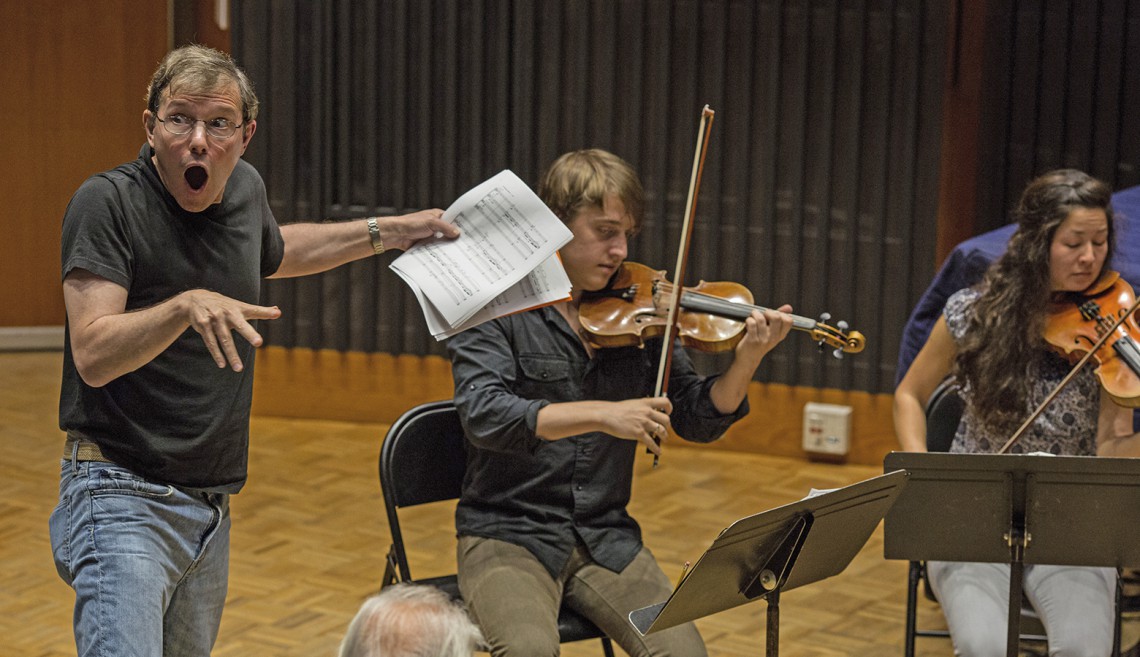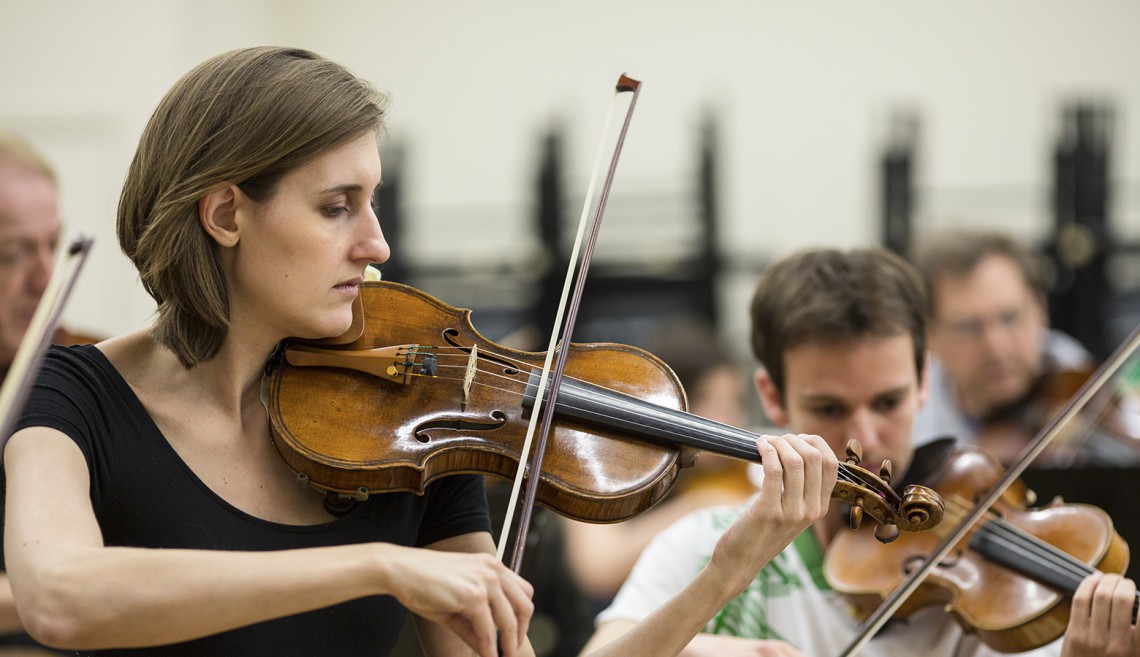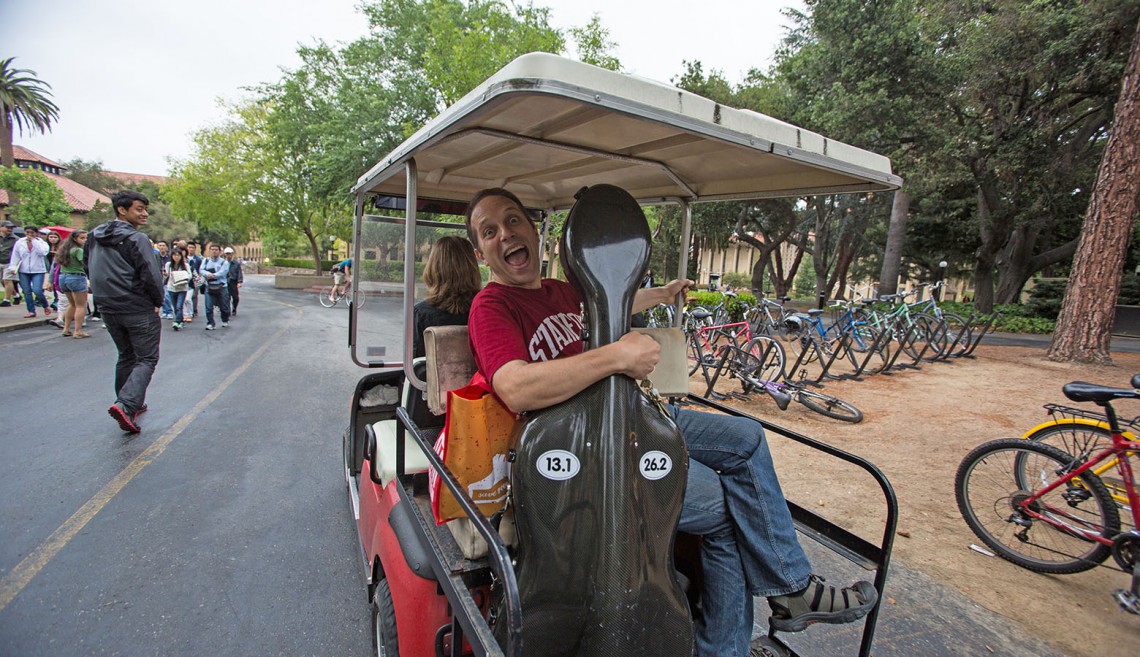-

Composer Rob Kapilow, a guest faculty member in the St. Lawrence String Quartet's Chamber Music Seminar, participates in a masterclass with Nicholas Tavani and Rachel Shapiro of the Aeolus Quartet.
Eric Cheng -

Sarah Nematallah, violin, of the Cecilia String Quartet concentrates during a reading session.
Eric Cheng -

Chris Costanza, cellist for the St. Lawrence String Quartet.
Eric Cheng
Eat, play, learn at Stanford: You can’t live without music
The St. Lawrence String Quartet's residential summer retreat at Stanford is a pilgrimage for musicians from far and wide to commune, perform and study together.
Speeding over the Mojave Desert on his blue BMW motorcycle with a viola strapped to his back, Robert Hauswald isn’t the typical professor of economics. But he is emblematic of the diverse performers who travel across the world each summer to attend the St. Lawrence String Quartet’s annual Chamber Music Seminar at Stanford. Lifelong amateur musicians join students and professional-track chamber groups to form a unique blend of intense study, performance and camaraderie.
Arriving on campus, Hauswald joined 80 musicians and faculty in the Campbell Rehearsal Room for a welcome meeting and kick-off dinner. The professional chamber groups have traveled together, while many individual musicians meet for the first time, about to jump into a week of intense rehearsing together.
The seminar takes over the Braun Music Center, filling every practice room and many faculty offices. The graduate student lounge becomes a meeting place where people can grab a snack and share classical music trivia with new friends.
Now celebrating its 25th season, the internationally acclaimed and award-winning St. Lawrence String Quartet has been the ensemble-in-residence at Stanford University since 1998.
The quartet, consisting of violinists Geoff Nuttall and Scott St. John, violist Lesley Robertson and cellist Christopher Costanza, performs regularly on campus, directs the Music Department’s chamber music and string program, as well as the annual chamber music seminar, and frequently hosts emerging quartets from around the world as part of the its Emerging String Quartet Program.
The St. Lawrence String Quartet champions and continues to be involved with a summer course for Stanford’s Education Program for Gifted Youth and is passionately engaged in the greater Stanford community through visits to local schools, businesses, laboratories, clubs and hospitals.
Hauswald (MS ’93, PhD ’95) says of his days at the seminar, “It felt strange to be back at Stanford in the pursuit of music and the arts rather than math, econ or the hard sciences. I met many interesting people at the seminar who proved to be most stimulating. I was particularly impressed by the care our coaches applied to our playing. Specifically, I felt that they put the same time, effort and thought into us amateurs as the professional groups.”
Deanna Choi, a returning student from Ontario, Canada, agrees with Hauswald on the unique nature of the seminar: “Beyond the members of my sextet, I was also able to connect with musicians from New York, Boston and across America; I exchanged emails with a photographer from San Francisco, and spoke at length with a physician from Toronto. I established global connections with people of completely varying backgrounds and careers, who all happened to be united by their love and passion for music.”
Work and reward
Choi has played violin since the age of 5 and considers it a lifelong passion. “Although I play in a professional orchestra back home in Kingston and participate in a variety of performances during the school year, there is no musical event that I look forward to more than the SLSQ seminar,” she said.
Her enthusiasm is shared by Min-Jeong Koh, a violinist with the Cecilia String Quartet: “Most people say that great performers don’t necessarily make the best teachers. Well, they haven’t met the SLSQ. In the past 25 years I have been privileged to study with artists from all over the world, but it is always special when one of those interactions give you that aha! moment.”
The Cecilia String Quartet, ensemble-in-residence at the University of Toronto’s Faculty of Music, first prize winner at the 2010 Banff International String Quartet Competition and winner of the recently announced 2013 John Lad Prize, still returns to work with the SLSQ at Stanford. “What makes them special is their ability to describe a work in such a way that you think you can’t live without music ever again,” Koh said. “These qualities shine especially bright at their seminar, where their commitment and love for music is infectious, as is their passion for connecting with both aspiring young artists and enthusiastic audiences.”
Intense play
A typical day at the two-week seminar begins at 8:30 a.m. in the Campbell Rehearsal Room, where 80 participants and faculty members gather to greet the day with a rousing 30-minute percussion session. After learning samba with instructor Mikael Ringquist, groups retreat to small practice rooms to rehearse and receive individual attention during coaching sessions with an SLSQ member. During a light lunch in the Braun Courtyard, students lean against the trees chatting with a guest speaker such as composer Rob Kapilow, followed by afternoon rehearsals and coachings. All the musicians gather at 4:30 p.m. to listen to guest faculty member cellist Nina Lee critique other students during a public masterclass.
The schedule is intense, but many players revel in geeking out on chamber music. A walk through the halls of the Braun Music Center at night reveals refrains of Haydn wafting from rehearsal rooms as musicians mix and match with other chamber groups. “Though we rehearsed coordinating bow strokes and I learned how to interpret Brahms’ often-cryptic scores,” Choi said, “what I truly learned from those 10 days goes far beyond Brahms and even music. I learned what it truly means to be part of an ensemble, a team, a group of people with widely different backgrounds and sometimes clashing opinions.”
Free music
As if coachings, rehearsals, films and presentations weren’t enough, during the summer seminar the SLSQ produces free concerts and masterclasses open to the public. This year over 2,500 people enjoyed free performances at Bing Concert Hall, as well as the Azure Concert Series for families with children and young adults on the autism spectrum. Families traveled from around the Bay Area to attend the three Azure concerts, while the five concerts at Bing drew buses of student groups and individuals from around campus.
Reflecting on the experience, SLSQ violist Robertson said, “The chamber music seminar has been a 15-year labor of love for the SLSQ. Having the opportunity to interact with such a diverse group of passionate musicians has been immensely rewarding for us, and the mixture of professional track and amateur track participants has been revelatory. The seminar is always a heady and exhausting 10 days, but I for one always emerge grateful for the experience.”
